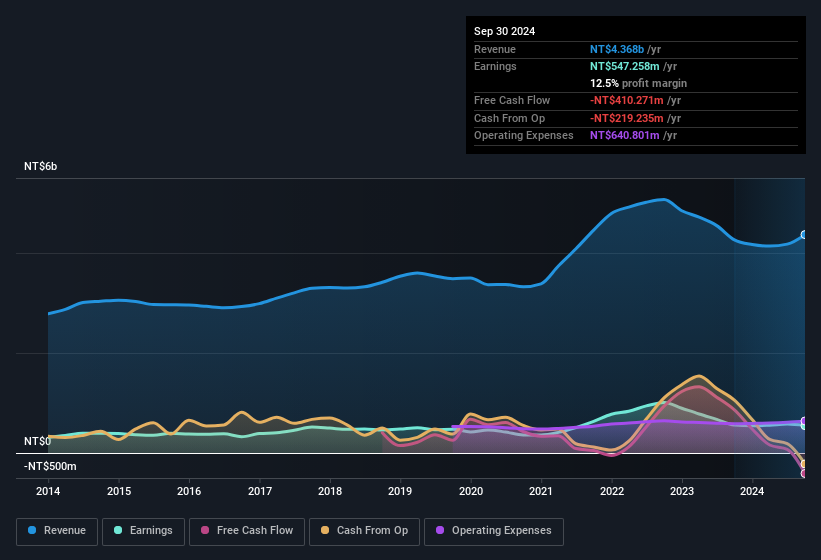The market for K.S. Terminals Inc.'s (TWSE:3003) stock was strong after it released a healthy earnings report last week. Despite this, our analysis suggests that there are some factors weakening the foundations of those good profit numbers.
View our latest analysis for K.S. Terminals

Zooming In On K.S. Terminals' Earnings
Many investors haven't heard of the accrual ratio from cashflow, but it is actually a useful measure of how well a company's profit is backed up by free cash flow (FCF) during a given period. In plain english, this ratio subtracts FCF from net profit, and divides that number by the company's average operating assets over that period. You could think of the accrual ratio from cashflow as the 'non-FCF profit ratio'.
Therefore, it's actually considered a good thing when a company has a negative accrual ratio, but a bad thing if its accrual ratio is positive. That is not intended to imply we should worry about a positive accrual ratio, but it's worth noting where the accrual ratio is rather high. To quote a 2014 paper by Lewellen and Resutek, "firms with higher accruals tend to be less profitable in the future".
For the year to September 2024, K.S. Terminals had an accrual ratio of 0.24. Therefore, we know that it's free cashflow was significantly lower than its statutory profit, which is hardly a good thing. In the last twelve months it actually had negative free cash flow, with an outflow of NT$410m despite its profit of NT$547.3m, mentioned above. It's worth noting that K.S. Terminals generated positive FCF of NT$861m a year ago, so at least they've done it in the past. The good news for shareholders is that K.S. Terminals' accrual ratio was much better last year, so this year's poor reading might simply be a case of a short term mismatch between profit and FCF. Shareholders should look for improved cashflow relative to profit in the current year, if that is indeed the case.
Note: we always recommend investors check balance sheet strength. Click here to be taken to our balance sheet analysis of K.S. Terminals.
Our Take On K.S. Terminals' Profit Performance
K.S. Terminals didn't convert much of its profit to free cash flow in the last year, which some investors may consider rather suboptimal. Therefore, it seems possible to us that K.S. Terminals' true underlying earnings power is actually less than its statutory profit. In further bad news, its earnings per share decreased in the last year. The goal of this article has been to assess how well we can rely on the statutory earnings to reflect the company's potential, but there is plenty more to consider. So if you'd like to dive deeper into this stock, it's crucial to consider any risks it's facing. Be aware that K.S. Terminals is showing 2 warning signs in our investment analysis and 1 of those is a bit unpleasant...
This note has only looked at a single factor that sheds light on the nature of K.S. Terminals' profit. But there is always more to discover if you are capable of focussing your mind on minutiae. Some people consider a high return on equity to be a good sign of a quality business. While it might take a little research on your behalf, you may find this free collection of companies boasting high return on equity, or this list of stocks with significant insider holdings to be useful.
Valuation is complex, but we're here to simplify it.
Discover if K.S. Terminals might be undervalued or overvalued with our detailed analysis, featuring fair value estimates, potential risks, dividends, insider trades, and its financial condition.
Access Free AnalysisHave feedback on this article? Concerned about the content? Get in touch with us directly. Alternatively, email editorial-team (at) simplywallst.com.
This article by Simply Wall St is general in nature. We provide commentary based on historical data and analyst forecasts only using an unbiased methodology and our articles are not intended to be financial advice. It does not constitute a recommendation to buy or sell any stock, and does not take account of your objectives, or your financial situation. We aim to bring you long-term focused analysis driven by fundamental data. Note that our analysis may not factor in the latest price-sensitive company announcements or qualitative material. Simply Wall St has no position in any stocks mentioned.
About TWSE:3003
K.S. Terminals
Manufactures and sells electrical terminals, automotive connectors, battery modular connectors, and EV charging connectors in Taiwan and internationally.
Flawless balance sheet with slight risk.
Market Insights
Community Narratives



